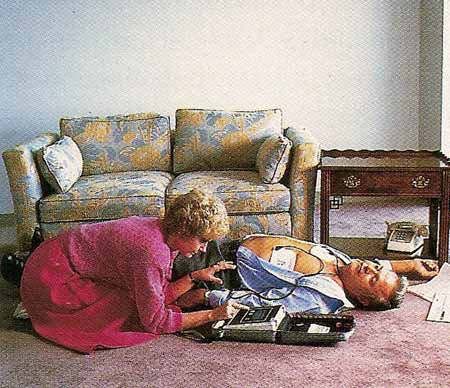
You're about to catch a train when a fellow passenger starts to complain of chest pain. You are worried he's having a heart attack. You call an ambulance, but next thing you know the man has collapse - and he loos dead. The only thing that will save him is an electric shock to his heart- and until help arrives, you need to keep the blood going to his brain and heart by doing the work of the heart for him using CPR. Panic sets in - you did a first-aid course at school, but you can't remember exactly what to do. And could you catch something when doing the '' kiss of life''? In fact, the advice on what you should do if you an adult, not a child, suddenly collapse has changed. Yes, first call an ambulance. But if you are not trained properly in CPR there's no need to worry about the kiss of life or the bit about breathing in to the patient's mouth. All you need to do is the chest compressions. Put your hands in the middle of the chest on the breastbone and push down as hard as you can, 100times a minute(roughly the same rhythm as the ''ah ah ah ah ah''bit in the Bee Gees song Staying Alive, I'd sing it in your head, though). Don't worry about doing some damage: it is better to be alive with a cracked rib then dead with ribs intact. And that is all you need to carry on doing until the ambulance arrives. If you are in a public area, there may be an automated defibrillator. It's easy to use. some one should get it and put it on the patient's chest and do what it tells you(yes it will speak) what next? even during CPR, the brain is not supplied with us much oxygen as from a fully functioning heart. This lake of oxygen causes the release of substances which damage the brain cells. We used to think there was nothing much that could be done about it and three in four patients brought to hospital alive following a cardiac arrest died soon afterwards or ended up with brain damage. However, following two recent trials, the current approach is to cool the brain down for 24 hours. This helps to stop the damage by preventing the release of these products, helping more and more patients survive cardiac arrest with a fully functioning brain. It used to be a miracle if someone survived a cardiac arrest if they weren't in hospital. But now using basic things: hands, electricity and ice- the miracles are becoming more common. Just remember: hands, not lips!
No comments:
Post a Comment